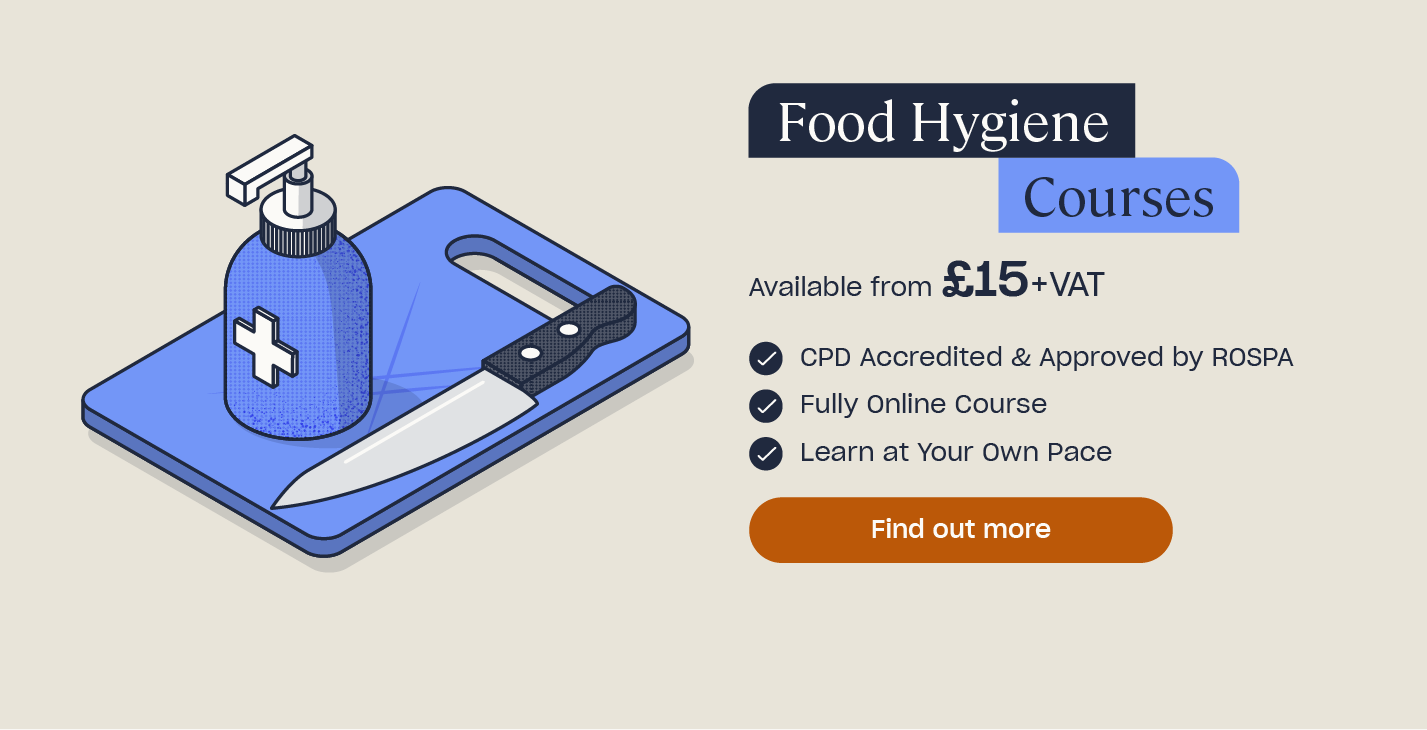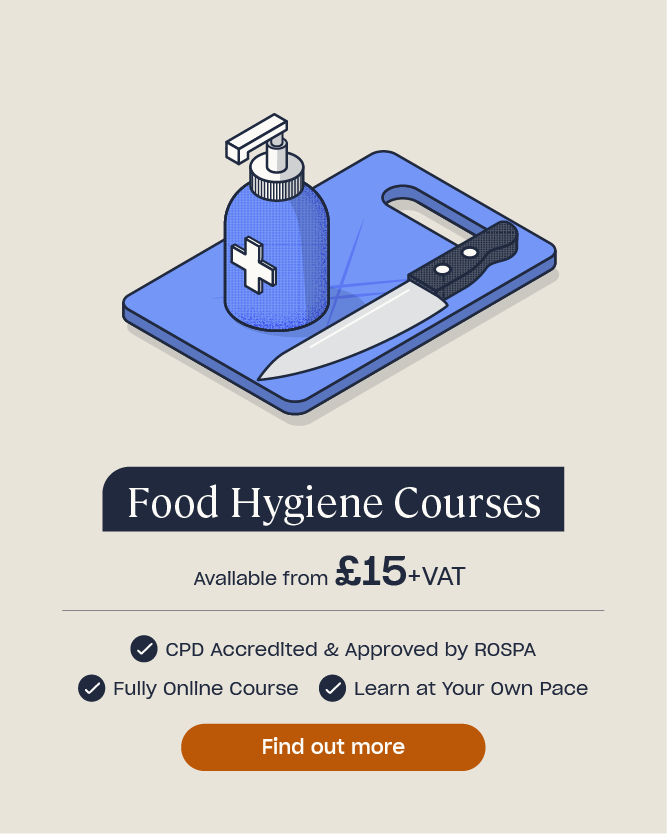BBQ Checklist: Preparation and Safety Guide
There’s nothing quite like a great British barbecue. The moment the temperature creeps above 13 degrees and the sun lingers in the sky past 1pm, it’s almost an unspoken rule that it’s time to spark up the grill! For many of us, barbecues with family and friends is the epitome of summertime fun and something we look forward to all year long.
With that in mind, we’ve developed this useful guide to help you prepare the perfect summer barbecue. In this article you will find tips and tricks on how to plan the perfect barbecue and a free handy checklist for you to download to make sure you’ve remembered everything you need to get your grill on!
BBQ Preparation
The key to any successful barbecue is thorough preparation. That means preparing food, utensils and cooking equipment in advance.
BBQ Menu
It goes without saying that food is the most important part of a barbecue. Yes, we’re all excited to spend time with our loved ones but let’s be honest, biting into a glorious burger topped with caramelised onions, is our first thought the second we see the grill sizzling! When it comes to your barbecue menu and shopping list, make sure you plan enough food for everyone, with a few extras tossed in just in case your grilling skills aren’t as great as you remember and the odd wayward sausage burns.
Don’t forget to have alternatives for different dietary requirements such as veggie and vegan burgers and hot dogs. If you are cooking veggie or vegan food it’s a good idea to cook these first so that they aren’t contaminated by meat products. This is also true if you are catering for anyone with allergies. Ideally you should prepare any allergenic food in a separate area but if you are not able to prepare the food on a separate grill, ensure that you cook it first, before any other food has come into contact with it to avoid cross-contamination.
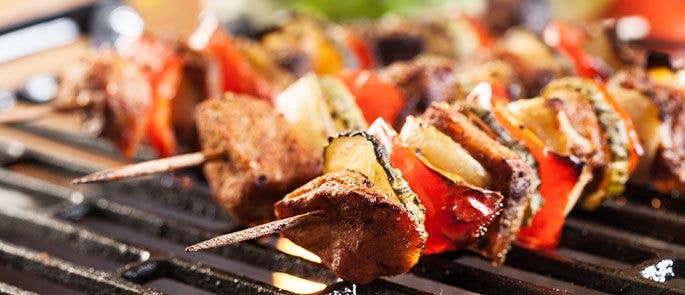
Now let’s talk about the menu! Everyone’s barbecue menu will differ, however there are a few barbecue staples that you will find on most summer spreads. Some essential barbecue items include:
- Sausages
- Burgers (don’t just limit yourself to beef; chicken, lamb and veggie are also great options)
- Hot dog and burger buns (why not try brioche buns for a street-food feel or potato buns to really impress your guests)
- Chicken wings and thighs
- Burger garnishes – lettuce, tomato, red onion etc.
- Cheese
- Mixed salads – basic salad, cous cous, potato salad etc.
- Skewers – make them with meat or fish such as prawns, chicken or chorizo
- Veggie skewers – make them with halloumi, red pepper, onion or courgette, or remove the halloumi to make them vegan
- Portobello mushrooms – these make a great vegan or veggie burger alternative
- Coleslaw
- Corn on the cob – this could get messy so make sure you’ve got some holders handy!
- Baking potatoes
- Condiments – think mustard, ketchup, mayonnaise, BBQ sauce or burger relish
Food Prep
Once you’ve got the food sorted you need to think about how it needs to be prepared. During the summer it’s easy to find a wide range of barbecue foods that are already prepared and ready-to-go and this can be a great way to save time and effort. However, if you prefer to do things yourself, you need to factor in time to get skewers made, chicken marinated and vegetables and salads prepared. Doing this the morning of your barbecue, or even the night before if you want your food to have extra time to marinate, can help make the day less stressful and give you more time to sit back, relax and enjoy the evening.
Food prep that will save you ample time includes:
- Preparing salads – wait till you are ready to serve to put the dressing on to avoid making the lettuce soggy.
- Chopping fruit and vegetables – whether it’s onions for burgers, carrot sticks for dip or strawberries for Pimms, pre-chop your fruit and vegetables the morning of and store them in an airtight container to avoid browning.
- Marinate meat – this includes veggie and vegan options as well, marinating your food from the night before gives it ample time to absorb all those delicious flavours and means on the day of the barbecue you can just throw it straight onto the grill.
- Prepare your skewers – if you are having a go at making your own skewers, save yourself a task and get them ready in advance using the meat and vegetables you prepped earlier. If you’re using wooden skewers don’t forget to soak them in water for a few minutes beforehand so that they don’t catch fire!
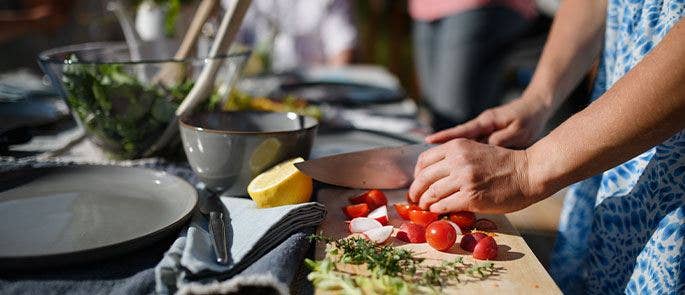
BBQ Supplies
Whilst food is undeniably an important part of a barbecue (after all a few burnt sausages are what make a barbecue a barbecue!), that’s all redundant without the right supplies! It’s not much of a barbecue if the barbecue itself packs in one hour into cooking. So if it’s been a while since you last used your barbecue, take the time to give it a quick clean ahead of time. Not only does this stop rogue cobwebs ending up in people’s food, it gives you a chance to double check that your grill is working as it should and that it has all the parts it needs.
Don’t forget your utensils either, tongs and spatulas are a barbecue must have and though not vital, a temperature probe is a great way to check that the internal temperature of your food has left the danger zone and is safe to eat. Speaking of safety, it can be tricky when cooking outside to keep things clean and hygienic so make sure you have suitable cleaning utensils and supplies on hand ready for when you need them. That means using different utensils for raw meat, cooked meat and non-meat foods and keeping food out of the sun and ideally covered whilst waiting to serve. A mesh food cloche is a great way to protect food from flies without having to individually cover several different items.
You may also choose to wear gloves when handling raw meat but it’s worth noting that they can harbour just as much bacteria as your hands and if you end up changing your gloves after handling every bit of raw meat, you risk generating a lot of waste. Gloves are a great way to protect your hands from heat and grease. However, they can also give you a false sense of cleanliness as it’s harder to feel when your hands have come into contact with dirt and you may end up spreading this onto other foods. Try using tongs instead, popping back inside to wash your hands when needed or keeping food safe antibacterial wipes/spray on hand.
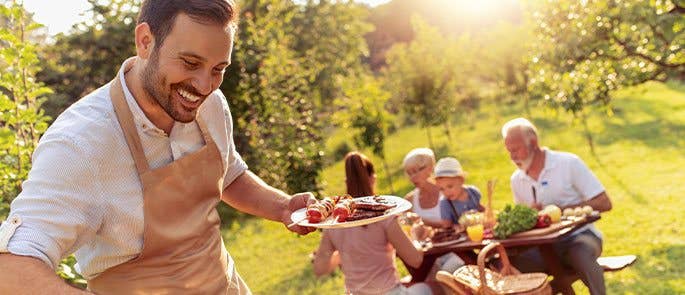
Here is a list of some supplies that will help any barbecue run smoother:
- Tongs
- Spatulas
- Knives
- Meat thermometer/temperature probe
- Coolbox
- Tupperware
- Kitchen foil
- Cling film
- Sponges and washing up cloths
- Food safe anti-bacterial wipes and spray
- Kitchen roll
- Paper plates
- Disposable cutlery
- Serving utensils
- Cups
Remember, when catering for different dietary requirements use different cooking and eating utensils to avoid cross-contamination.
BBQ Food Safety
We Brits love a good barbecue. So much so it’s estimated that Brits fired up their barbecues on approximately 115 million occasions in 2024! However, despite your dad’s insistence that he is the grillmaster of all grillmasters, barbecues can pose food safety risks if food is not cooked, prepared or handled properly. Whilst sunshine is a vital ingredient to a great barbecue, according to the Food Standards Agency (FSA) warm weather and outdoor cooking are the perfect conditions for bacteria to grow. This bacteria can then easily spread from raw meat to cooked food, subjecting unsuspecting barbecue guests to a nasty case of food poisoning.
Here are some handy hygiene tips to bear in mind when firing up the barbie this summer so that you and your guests can safely enjoy your al fresco feast:
- Clean the grill – if it’s been a while since you last sparked up the barbecue, it’s important that you take the time to inspect and clean it. Follow the manufacturer’s instructions for proper cleaning and maintenance and ensure that the grill is clean before you start cooking anything.
- Ensure the barbecue is hot enough – if you are cooking with charcoal, don’t start cooking until the coals are glowing red with a powdery grey coloured surface. This is when the heat is evenly distributed. It’ll stop your meat from being burnt on the outside but raw in the middle.
- Wash your hands – effective cleaning gets rid of any bacteria on your hands and stops it from spreading onto other food or utensils. Wash your hands thoroughly with soap and warm water. As mentioned, you may choose to wear gloves but unless these are being changed regularly, there is no guarantee that they are safer than using your bare hands.
- Clean utensils and surfaces – clean all utensils before using them and ensure you have separate utensils for raw, cooked and ready-to-eat foods. You may also need to have separate utensils if you are serving people with different dietary requirements or allergies. Ensure that you keep all surfaces clean and clean up any spills immediately with kitchen roll or food safe antibacterial wipes.
- Keep food cool and covered – use a coolbox filled with ice packs to minimise bacterial growth on raw or chilled food outside the fridge. It’s advisable that you don’t leave food out of the fridge for longer than half an hour, so a coolbox is a handy way to keep it out for longer whilst keeping the food out of the temperature danger zone. Hot weather encourages bacteria growth so don’t leave any food in the sun and be sure to keep it covered to provide shade and protect it from pests.
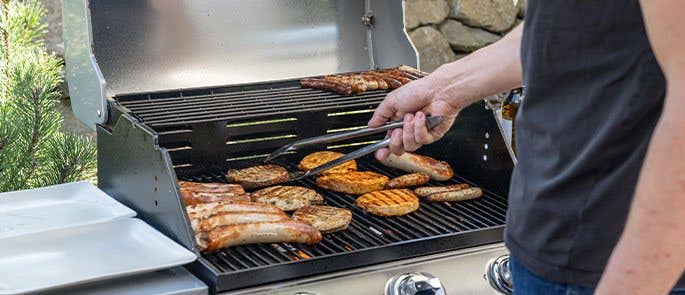
- Thoroughly defrost food – thaw all frozen food thoroughly before cooking. The best way to defrost food safely is in the fridge overnight to prevent dangerous cold spots.
- Check use-by dates – when preparing for a barbecue it’s common to stock up on supplies a few days in advance. Double check the use-by and best before dates on any food you are serving, especially any condiments that may have been sitting in the back of your cupboard longer than they should have.
- Consider cooking meat in the oven first – meat such as chicken or pork cannot be eaten rare as this will cause serious food poisoning. To avoid overcrowding your grill and to ensure everything is cooked properly, consider cooking chicken and pork in the oven first and then finishing it off on the barbecue for that lovely chargrilled flavour.
- Check the internal temperature – all meat should be cooked to a minimum core temperature of 70oC for at least two minutes to ensure that it is safe and that any harmful bacteria has been killed. Use your probe thermometer to check that the internal temperature is correct. If you don’t have a probe thermometer, cut into meat to check that it is cooked all the way through and if you have the slightest doubt that it isn’t, cook it a bit longer until you are sure.
- Avoid cross-contamination – using separate utensils and regularly washing your hands will help to avoid cross contamination. However, it can also happen when placing food onto the grill as raw food can drip onto cooked and ready-to-eat food. Store ready-to-eat food away from the cooking area to help reduce the risk of cross-contamination and avoid overcrowding around the barbecue.
- Don’t reuse marinades – it can be tempting to reuse a marinade by brushing some of the leftovers onto cooked meat for an extra boost of flavour. However, if the marinade has been in contact with raw meat then this can lead to cross-contamination. If you want to reuse a marinade as a baste, the FSA advises boiling it in a pan for a few minutes first.
- Try to serve food immediately – it can be hard to serve food immediately at a barbecue; children are often too busy running around and adults are too busy enjoying the rare sun and a nice glass of Pimms. However, the longer food is left to sit out, the greater the risk of food poisoning. Lean into the beauty of a barbecue and the constant carousel of food that it provides and encourage people to grab food as soon as it’s ready. If you are grilling up a big batch that won’t be served straight away, hold hot food at a minimum temperature of 63oC until served. Remember to store any leftover or partly opened food properly to keep it fresh for longer and reduce food waste from improper storage.
These tips may seem obvious, but they can be easy to forget in the heat of the moment. Take a second to plan ahead, prepare in advance and make sure everything you need to barbecue safely is within reach so that your barbecue is as enjoyable and relaxing as possible.
BBQ Checklist PDF
Below you will find a free downloadable barbecue checklist to help take some of the stress out of hosting! The checklist has been separated into sections and includes some barbecue essentials that can help make your day as carefree as the summer sun. The list is not exhaustive but there is space to add your own personalisations and barbecue must-haves.
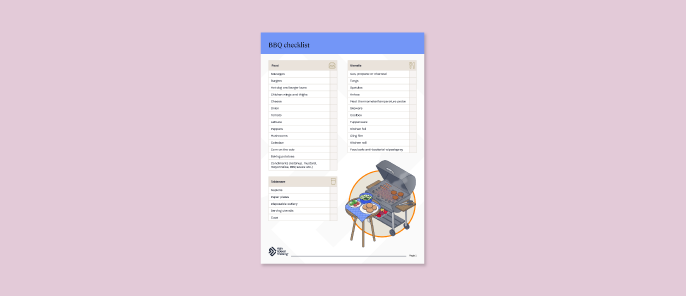
Nothing marks the arrival of summer like a barbecue. Not only are they great ways to enjoy some rare British sunshine, they bring people together to enjoy some delicious, mostly unburnt, food. Taking the time to plan in advance and prepare items ahead of time can take the stress out of hosting and make your barbecue a smooth and enjoyable experience for all.


